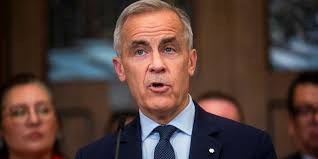Prime Minister Carney Unveils Tougher Tariffs and Support Measures to Protect Canadian Steel Industry

Hamilton, The Gulf Observer: Prime Minister Mark Carney has pledged stronger action against the influx of cheap foreign steel into Canada, announcing a new set of trade measures aimed at protecting the domestic steel industry as it reels from steep tariffs imposed by U.S. President Donald Trump.
Speaking in Hamilton on Wednesday, Carney outlined significant reforms to Canada’s steel import regime, including a tightening of tariff rate quotas and the imposition of new tariffs designed to prevent unfair dumping. The announcement was welcomed by industry leaders who have been grappling with declining production and job losses in recent months.
“In recent weeks, our domestic steelmakers have faced unfair competition, and these changes will ensure Canadian producers regain a bigger share of the Canadian market,” Carney said.
Under the revised policy, steel imports from non-free trade agreement (non-FTA) countries — including China and Turkey — will now face much stricter limits. The government will reduce their tariff-free quota to half of 2024 levels, with a 50 per cent tariff imposed on any imports exceeding those thresholds.
Canada will also apply the same 50 per cent over-quota tariff to steel products imported from FTA partners — excluding the United States and Mexico — if they exceed 2024 import volumes. In addition, a 25 per cent tariff will be imposed on all imports from non-U.S. countries containing steel that was melted and poured in China.
Carney stressed that Canada imports nearly two-thirds of the steel it consumes, compared to less than one-third in the United States and under one-sixth in the European Union. Existing trade arrangements under the Canada-U.S.-Mexico Agreement (CUSMA) will remain unchanged for now, as both countries work toward resolving tariff disputes before an August 1 deadline.
Industry Reaction: Relief and Caution
Catherine Cobden, President and CEO of the Canadian Steel Producers Association, expressed relief following the announcement.
“It’s certainly a much better place than where we were yesterday,” she said, adding that the new measures would help Canadian producers recapture market share. “I can’t say it will completely offset the loss from the U.S., but it will help us.”
Michael Garcia, CEO of Algoma Steel, called the changes a “step forward,” saying they would help close loopholes that had allowed foreign producers to flood the Canadian market. Still, he cautioned that much depends on the outcome of upcoming negotiations with Washington.
Conservative MP Shelby Kramp-Neuman welcomed the revised quotas as a “step in the right direction,” but emphasized her party’s opposition to any deal that allows U.S. tariffs to remain. “Carney ran on not backing down. We expect him to deliver,” she said.
Bloc Québécois Leader Yves-François Blanchet criticized the prime minister for what he called a “series of compromises,” arguing that Ottawa has yet to secure any meaningful concessions from the U.S.
Support for Steelworkers and Canadian Industry
In addition to trade measures, Carney unveiled new investments to support steelworkers and modernize the industry. These include:
- $70 million in training and income support for up to 10,000 affected workers;
- $1 billion through the Strategic Innovation Fund to support innovation and expansion in the steel sector;
- New procurement policies requiring federal contractors to use Canadian steel in infrastructure projects.
“Our government will prioritize Canadian steel for building millions of homes, bridges, ports, energy infrastructure, and our security needs,” Carney stated.
As the August 1 deadline for a deal with the United States approaches, industry and political stakeholders are watching closely to see whether Carney’s toughened stance will yield long-term relief for Canada’s steel sector.


